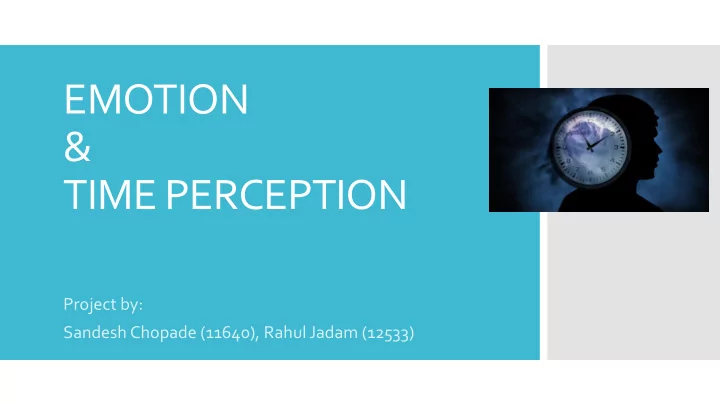

EMOTION & TIME PERCEPTION Project by: Sandesh Chopade (11640), Rahul Jadam (12533)
Time as the rate of passage of events. Subjectivity of time (absolute v/s perceived time) ‘Sitting on a park bench…’ Emotions – do they make a difference? INTRODUCTION Induction of affective states by environmental stimuli. Auditory stimulus as a manipulator of the affective state, and the influence of mood. Use of music for influencing time perception in real life.
Effect of the environmental stimuli on affective states studied extensively. Research on how such relationships influence time perception BACKGROUND started only recently. Popular beliefs stem from experiences (music helps in meditation, study, etc.). Very few studies done for determination of chief influencing characteristics of music.
INTERNAL CLOCK MODEL Treismanand Gibbon (1984)
Analysing time perception of emotional (auditory) stimuli varyingly characterized, and testing conformity with the scalar INTENTION expectancy theory (Gibbon & Church, 1984) & Determining characteristics of the stimuli which result in significant variance in time perception. GOAL Observing (previously unknown) effects of emotional stimuli on time perception when coupled with performance-based tasks.
Experiment 1: Creating the dataset using subjective ratings of auditory stimuli Goal : Obtaining ratings for subjective characteristics (arousal, valence, affective state induced) of the test samples. Soundtracks chosen initially based on rudimentary ratings. EXPERIMENT DESIGN Experiment 2: Affective state and time perception Goal : Observing how induced base affective states influence perception of time. Person estimates time of the stimulus duration itself .
Experiment 3: Study of effects of affective stimulus on performance-based tasks Goal : Analysing time perception and performance in a EXPERIMENT common task when coupled with affective stimulus (music) DESIGN Hypothesis : While valence and affective state would influence performance in the game, the major determinants of both time perception and performance could be the arousal generated by the music and the tempo of the music.
Experiments 1 & 2: 40 subjects chosen. Asked to report the best estimate of stimulus duration, the valence and arousal generated by the musical piece. Ratings done on a self-assessment manikin: PROTOCOL Manikin (with text labels) used for rating arousal of test sample Temporal bisection regime used. Statistical methods will be used to analyse the variation generated in perceived stimulus time for each sample.
Experiment 3: (with guidance from Prof. Gianna Cassidy’s lab) 3 games selected: 1. Variable difficulty, time unbound (temple run) 2. Fixed difficulty, time bound (fruit ninja) 3. User-dependant difficulty, time unbound (paper toss) PROTOCOL Different kinds of audio stimulus used with variable arousal (high/ low), valence (positive/ negative), and tempo (high/ low). Subject to estimate duration of gameplay. Scores used as measure of performance. Normalization done by contrasting performance in no- stimulus environment.
24 subjects successfully performed Experiments 1 and 2. CURRENT Available data suggests consistency in ratings, with considerable PROGRESS variance in time perception of the stimulus.
Exp. 1 & 2 on more subjects for robustness of data analysis. FUTURE Experiment 3 OBJECTIVES Analysis of collected data to attain objectives.
Marion Noulhiane, Nathalie Mella, et al. (2007), How Emotional Auditory Stimuli Modulate Time Perception , Emotion Sylvie Droit-Volet, Danilo Ramos, et. Al (2013), Music, emotion, and time perception: the influence of subjective emotional valence and arousal? Frontiers in Psychology REFERENCES Treisman,M.(1963). Temporal discrimination and the indifference interval :implications for a model of the “internal clock .” Psychol. Monogr. 77, 1 – 13. Cassidy GG, Macdonald RA (2010), The effects of music on time perception and performance of a driving game ., Scand J Psychol., 455-64
THANK YOU
Recommend
More recommend